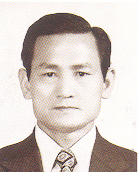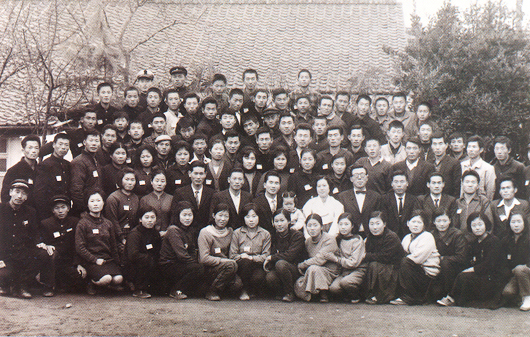Chapter 2 The Unification Movement in Korea
Early Church Activities
(Pioneering Songjeong-ri Church)
Han-su Kim
 August
15, 1959, I was to depart for pioneering in Songjeong-eup, South
Cholla Province. At first I went to Seobong-ri, six kilometers from
Songjeong-ri, where I helped with farm work in the daytime, and
at night, witnessed to and educated the young people of the village.
As far as educational work was concerned, the entire village seemed
to welcome it, but when I began to witness, opposition arose. The
villagers denounced and threatened the owner of the house I was
staying in, and persuaded the parents and elder brothers of the
young people coming to the church to educate them properly.
On days when service were held, imploring voices and cries could
be heard from practically every house.
August
15, 1959, I was to depart for pioneering in Songjeong-eup, South
Cholla Province. At first I went to Seobong-ri, six kilometers from
Songjeong-ri, where I helped with farm work in the daytime, and
at night, witnessed to and educated the young people of the village.
As far as educational work was concerned, the entire village seemed
to welcome it, but when I began to witness, opposition arose. The
villagers denounced and threatened the owner of the house I was
staying in, and persuaded the parents and elder brothers of the
young people coming to the church to educate them properly.
On days when service were held, imploring voices and cries could
be heard from practically every house.
The landlord urged my to leave my room, unable to put up with the opposition of the villagers. Thus, I prayed, and after looking east and west, I was able to find some land on a foothill, and began to grow some rape seed. There were some young church members, but fearing the persecution of their parents, no one could even think of helping me. With a pick and shovel, I tilled the land, collected soil and began to make mud bricks. As my body was weak with hunger, when I continued hard labor, at times I collapsed or lost consciousness.
When the villagers discovered I was trying to erect a church in the village, they, including the parents of members, came to persecute me further.
After many a trial and error I succeeded in casting over five hundred bricks. However, when it rained throughout the night once, all of the five hundred bricks turned back to clay. The villagers began to raise a clamor. "See there! Even heaven stops you from building a church! If God is with the Unification Church, why would He lay waste to all the bricks that you took so much trouble to make?" they snickered. Yet, with some members, we began to cast bricks again.
The issue of the bricks was now resolved, but we needed money to build the church. Young female members borrowed some money which they were to return with interest in the autumn, and prepare the necessary materials. Then, parents who discovered this came to me to protest, saying, "Other churches first build a church and then ask for donations, but the Unification Church has no sense, no financial power, and borrows money from such people." Furthermore, member of established churches who heard that a Unification Church was being built began to write articles against us in the newspaper and magazines, absolutely protesting the construction.

In the midst of such chaos, we started to build the new church. One day, when I returned to my room late, after lying bricks at the site, there was an ultimatum from the landlord who no longer could put with the persecution. Before I knew it, my feet carried me to the building site again. I wanted to throw my tired self down onto the ground, but I began to pray, holding onto some bricks. I did not notice the darkness surrounding me becoming light, and turn to dawn. I don't know how much time I had spent there; my tears had dried, and it seemed that only my consciousness was alive and moving.
Then, I heard someone's voices. "You have a rough life for a young man, don't you. Why don't you have dinner with us?" I was shaken by indescribable filings and moved to tears. Without much hesitation, I explained the circumstances, and shared God's words with him. And then I helped with the farm work as much as I could. Most of the family members were touched by my well-meaning attitude and the truth and allowed me to live with them. I began to regain stability of heart and hearth, and devoted energy to the building of the new church with more speed.
One night, some of those opposing the church broke sown the church wall and carried off the door frame. As we were in the process of rebuilding the walls, but wondering what to do without a door frame, a young woman member named Bok-soon Kim received in a dream that the church had collapsed and where the frame had been abandoned. Thus we were able to recover the door frame which was hidden in a small gorge some four hundred meters from the church. Through the grace of Heaven, we were able to find the frame, but the next problem was finding vertical beams. Members brought some from their homes, from lumberyards, and we were also able to collect trees felled by typhoon Sarah. In this way we accumulated enough wood, and we were able to obtain reeds to thatch the roof.
In this way, after countless hardships we were finally able to prepare a house for God, the small holy temple which we had dreamed of.
After the church was built, we devoted our efforts to full-scale witnessing. Many were beginning to come to the church from neighboring villages, and the membership now grew to more than thirty. Those opposing the church began to accuse and persecute the members, claiming that the reason the young men of neighboring villages were coming all the way to our church was for the women. They clamored that morality was declining in the villages because of the Unification Church, and that the village would be destroyed some day.
One day there was an incident in which someone picked a fight with a young man named Sang-guk Lee after he left for the church service. He lost a tooth in the fight. Under such circumstances, we members united more closely with each other, relying on, comforting and encouraging each other. When the opponents found it difficult to counter us on their own, they found means to apply pressure politically. Someone had charged that Ms. Jin-sun Kang, one of the central founding member of the church was connected to the Democratic Party. Members of the investigation squad of the Kwangsan Police Department claimed that some inquiries had to be made, and went after innocent young members, indirectly threatening the church. A desultory atmosphere spread throughout the village as a result.
Next, the persecution reached me. At the time, I had still not completed my military service. Using this as an excuse, the police requested me to move to another place. Taking various factors into consideration, it was decided that I move to Jung-eup on February 24, 1960.
After moving to Jung-eup, I caught word of what was happening in the former village of Pyung-dong. The people of the village had a quarrel with our members as to why they were coming in from another village, and it even developed into a fight. Using this as an excuse, the opposition, claiming that the Unification Church must be eliminated because they were the cause of fights every day in the neighborhood, got together and destroyed the church. Upon hearing this, I felt enraged, and immediately went to Songjeong-ri. When I arrived around eight o'clock in the evening at Seobong-ri, the sacred temple that we had built at the sacrifice of the blood, sweat and tears of our members had been torn down so badly that I could not bear to look at it. As I looked on with indescribable emotions, twenty-some young men swarmed around me like bees, calling me the origin of the problem. They started to beat me without mercy; I don't know how long they continued to beat me before I lost consciousness and fell to the ground. My mouth wouldn't open as I was hit in the jaw, my entire body was covered with blood, and I went into a coma.
I am not sure how much time had passed. Gradually I began to regain consciousness. I felt I could not die. I must live to become a living witness of history. I could not allow myself to be beaten to death by those who were ignorant of the truth. I must live and testify God's words to more and more people. After three or four hours had passed, it seemed that the assailants had also be come tired and left.
I dragged my painful body up and began to walk where my feet took me. In the morning I arrived at Imgok, took a train back to Jung-eup to receive treatment. Following this, Mr. Bo-hi Pak, a member at the Headquarters Church flew down and filed a suit against the assailants for destruction of property and infliction of bodily injury. The time was immediately after the April 19 implementation of martial law, and the destruction of property was to be handled by the Martial Law Command whose penalties were severe. Police came down immediately to arrest the leaders of the assailants. However, all of the members led by Mr. Kwang-bok Lee decided to forgive them and the suit was completely withdrawn.
The young men who had destroyed the building said that they would rebuild the church, and hearing this, the Kwangju Martial Law Command also offered to send their engineer unit to rebuild the church. However, we declined all of their offers, and the holy church was to be rebuilt completely by the hands of our sincere members. After this nightmarish period was over, persecution by the villagers also came to an end. Eleven members of this church received the Blessing, and at one point in time the church became the headquarters for the Kwangsan district.